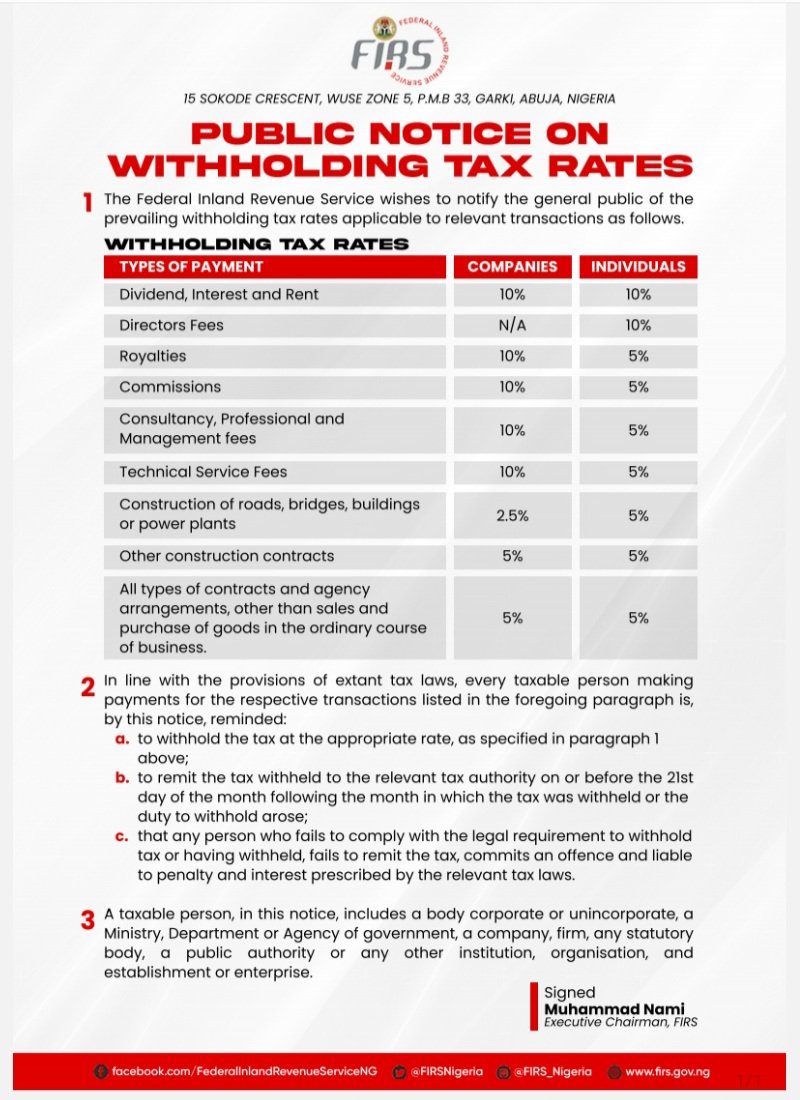
Private companies have now been given go-ahead to construct federal roads across the country on conditions spelt out in the new Executive Order 007 of 2019 on the Road Infrastructure Development and Refurbishment Investment Tax Credit Scheme which was assented to by President Muhammadu Buhari today, Friday at Council Chambers of the Presidential Villa, Abuja.
The private companies such as Dangote group, Unilver, Lafarge Africa and the rest are now allowed to construct major roads across the country and be paid in the form of Tax credit.
Giving the details of the Executive Order during the signing, the Minister of Finance, Mrs. Zainab Shamsuna Ahmed said that the Scheme is based on the demand for road projects by companies and other corporate sponsors, who are willing to deploy their own working capital and financial resources to fund road projects located in the major economic corridors of the country where they have significant businesses and operations.
She said: “in this Pilot Phase, the following 6 private sector companies have chosen to participate in the Scheme: Dangote Industries Limited; Lafarge Africa Plc; Unilever Nigeria Plc; Flour Mills of Nigeria Plc; Nigeria LNG Limited and China Road and Bridge Corporation Nigeria Limited.”
According to her, these Investors will be investing in what she called 19 Eligible Road Projects, totalling 794.4 kilometer which have been prioritized in 11 States across each of the 6 Geo-Political Zones.
They are Construction of Ashaka-Bajoga Highway in Gombe State; Reconstruction of Dikwa-GambaruNgala Road in Borno State; Reconstruction of Bama-Banki Road in Borno State;
Rehabilitation of Sharada Road in Kano State; Rehabilitation of NnamdiAzikiwe Expressway / Bypass, in Kaduna State; Reconstruction of BirninGwari Expressway – Road in Kaduna State; Reconstruction of BirninGwari – Dansadau Road in Kaduna State.
Others are Reconstruction of Makurdi-Yandev-Gboko Road in Benue State; Reconstruction of Zone Roundabout-House of Assembly Road in Benue State; Reconstruction of Obajana-Kabba Road in Kogi State; Reconstruction of Ekuku-Idoma-Obehira Road in Kogi State; Construction of AdaviEba-Ikuehi-Obeiba-Obokore Road in Kogi State; Rehabilitation of Lokoja-Ganaja Road in Kogi State; Ofeme Community Road Network and Bridges in Abia State; Rehabilitation of Obele-Ilaro-Papalanto-Shagamu Road in Ogun State; Reconstruction of Sokoto Road in Ogun State; Reconstruction of Apapa-Oshodi-Oworonshoki-Ojota Road in Lagos State; Construction of Bodo-Bonny Road & Bridges across Opobo Channel in Rivers State and Rehabilitation of Benin City – Asaba Road in Edo State.
“In deed, we are actively soliciting for more serious proposals from interested Investors, State Governments and other stakeholders who may wish to take advantage of this Scheme to partner with the Federal Government in investing in roads. Our intention is for there to be at least one significant Eligible Road Project underway in every State of the Federation within the first year of the operation of this Scheme.
“In terms of process and governance, prospective road projects are to be submitted to the Government via the Scheme’s Management Committee. This Management Committee, which I chair, has the Minister of Power, Works and Housing as its Deputy Chairman, and the Permanent Secretary of the Federal Ministry of Finance as its Secretary. The other members of the Management Committee are drawn from a number of relevant Federal Ministries, Departments and Agencies (‘MDAs’). They include:
- a) The Federal Ministry of Finance;
- b) The Federal Ministry of Power, Works and Housing;
- c) The Federal Ministry of Industry, Trade and Investment;
- d) The Federal Ministry of Justice;
- e) The Bureau of Public Procurement;
- f) The Federal Inland Revenue Service;
- g) The Nigerian Investment Promotion Commission;
- h) The Securities and Exchange Commission;
- i) The Infrastructure Concession Regulatory Commission;
- j) The Budget Office of the Federation;
- k) The National Bureau of Statistics;
- l) The Nigeria Sovereign Investment Authority; and
- m) The Office of the Chief of Staff to the President.
“After carefully considering submissions by Investors, the Management Committee will forward the proposals, through the Chairman of the Committee, to Mr. President, who is empowered, pursuant to the Executive Order, to select Eligible Road Projects. Once approved, these Eligible Road Projects will be published in an Official Gazette, and modalities would be agreed upon with the Investors to accelerate the implementation of these projects, the verification of eligible project costs, as well as the issuance of tax credit certificates to the Investors.
“This Executive Order also provides mechanisms for groups of investors to pool funds together to invest in road projects – directly; jointly through special purpose vehicles; or indeed, in collaboration with institutional investors such as Pension Fund Administrators, Collective Investment Schemes, Insurance Companiesand Investment Banks. These measures have been adopted to enhance the ease of accessibility to the Scheme’s benefits by prospective Investors.
“The Scheme’s implementation is to be supported by a rigorous monitoring and evaluation (‘M&E’) framework, which draws from the traditional capabilities of the Ministry of Power, Works and Housing, and Bureau of Public Procurement (‘BPP’), as well as the more innovative M&E framework which we have adopted in the implementation of ourN2.5 trillion Presidential Infrastructure Development Fund,which is currently anchored by the Nigeria Sovereign Investment Authority (‘NSIA’).
“As is the case with all such tax expenditures, there is the need to ensure adequate safeguards to protect the National Treasury. In this regard, the Executive Order provides several prudential measures to enhance the integrity of the Scheme. These include the following:
“Investors may only be permitted to recover relevant project costs after these costs have been duly scrutinised by the Management Committee to ensure that only those costs that are wholly, reasonably, exclusively and necessarily incurred in the development and maintenance of the Eligible Roads are recouped;
“The quantum of tax credits that may be utilised by any participating Investor is restricted to ensure that in every tax year, the Investor must pay at least half of its normal corporate tax liability. However, unutilised tax credits may be deferred for use in subsequent fiscal years until the investments in the Eligible Road Projects are fully recouped;
“Investors shall not be entitled to claim any other tax credit, capital allowance, relief or incentive on relevant project costs incurred in respect of any Eligible Road Project under any law in force in Nigeria, in addition to the tax credits provided pursuant to this Scheme. This is to avoid a duplication of claims being made;
“The Scheme upholds the powers of the Federal Inland Revenue Service, pursuant to Section 22 of the Companies Income Tax Act, to set aside any artificial or fictitious transactions that may be used to evade taxes, in accordance with extant anti-avoidance laws; and
“Fiscal Implication Reports will be regularly generated to monitor and track the fiscal costs of the Scheme in line with extant laws.”
The minister acknowledged the diligent work that has been undertaken, since October 2017, when the Federal Executive Council first granted approval-in-principle for this Scheme. The Executive Order being signed by President Muhammadu Buhari today is the outcome of these efforts, and I thank the members of the Technical Steering Committee for their commitmentand industry.








